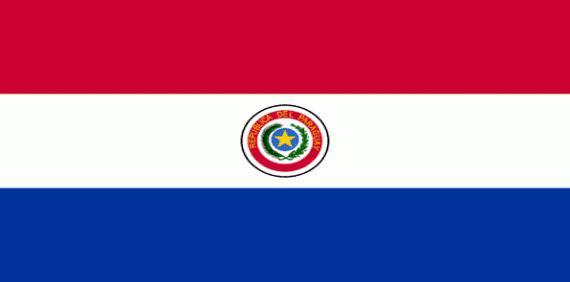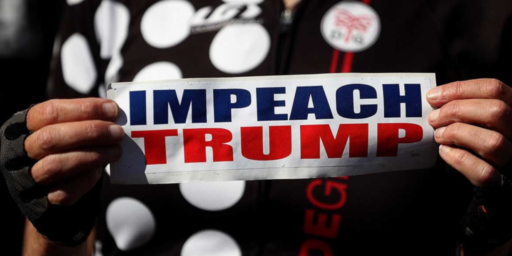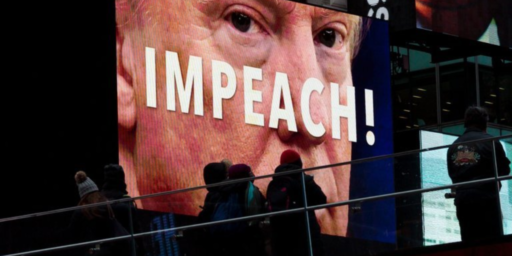Paraguay’s President Impeached and Removed
President Fernando Lugo of Paraguay was impeached and removed from office this week.
 Via the BBC: Paraguay President Fernando Lugo impeached by congress
Via the BBC: Paraguay President Fernando Lugo impeached by congress
Both houses of Congress had voted on Thursday to begin impeachment proceedings over his handling of clashes between farmers and police last week in which at least 17 people died.
Mr Lugo likened the move to a coup by the right wing-controlled parliament, but said he would accept the decision.
Vice-President Federico Franco has already been sworn in as president.
He will serve the remainder of Mr Lugo’s five-year term, which ends in August 2013.
After previously trying to get the Supreme Court to stop the impeachment vote, the fallen president said he accepted “what the law has stated, even though the law was twisted”.
My knowledge of Paraguayan politics is limited, but a quick perusal of the constitution indicates that the impeachment process is fairly similar to that of US. According to USAT, the vote was 39 Senators for removal, 4 against and 2 not present. The process was fast: the House impeached on Thursday, a five-hour trial was held in the Senate and then, adios Señor Presidente. The USAT piece also notes that Lugo’s lawyers requested 18 days to prepare for the Senate trial, but were denied the request. Regardless of anything else, that is a remarkably short process for a very serious action and it is likely to have long-term political consequences.
These types of situations are tests for countries like Paraguay which have histories of authoritarianism and where politics is very much influenced by power inequities within the society. Lugo’s accusation of a coup are potentially quite inflammatory, but at the moment it would appear that the situation has proceeded in an orderly manner (albeit quite quickly). Well, relatively orderly, as there have been street protests.
The background for the political confrontation was a confrontation of a different kind:
During the clashes in eastern Canindeyu province that prompted the impeachment move, more than 300 police officers tried to evict 150 landless farmers from an estate owned by a wealthy businessman who is also a political opponent of Mr Lugo.
The eviction escalated into violence and the farmers opened fire on the police.
The farmers have argued the land was illegally taken during the 1954-1989 military rule of Gen Alfredo Stroessner and distributed among his allies.
Land disputes are not unusual in Paraguay, where a small fraction of the population owns about 80% of the land.
Mr Lugo – a former Catholic bishop who abandoned priesthood to enter politics – campaigned for the needs of the poor.
Before being elected in 2008, he promised land for some 87,000 landless families.
The above-linked USAT piece also notes:
The president also was tried on four other accusations. They include that he improperly allowed for leftist parties to hold a political meeting in an army base in 2009; that he allowed about 3,000 squatters to illegally invade a large Brazilian-owned soybean farm; that his government failed to capture members of a guerrilla group, the Paraguayan People’s Army, which carries out extortion kidnappings and occasional attacks on police; and that he signed an international protocol without properly submitting it to Congress for approval.





This was a classic political coup. The President and Vice-President were from different parties,elected as a coalition. Over time, the coalition broke down and the vice president joined the opposition. He supported the impeachment, naturally. Very similar to a vote of no confidence in parliament, but they don’t hold new elections.
Franco – now there’s an appropriate name for a right wing president.
This was a classic political coup. The President and Vice-President were from different parties,elected as a coalition. Over time, the coalition broke down and the vice president joined the opposition. He supported the impeachment, naturally. Very similar to a vote of no confidence in parliament, but they don’t hold new elections.
Largely troublesome because the former president broke 60 years on one-party rule and since he wasn’t even allowed to complete a term, it calls the democratic nature of the Paraguayan leadership into question.
I think Obama was born in Paraguay.
@Ron Beasley:
Franco is the leader of the Authentic Radical Liberal Party, which is considered a center party.
Also, 87% of the Senate voted to have Lugo impeached, so it doesn’t seem to be a right wing coup exactly.
I do wish I knew more about Paraguayan politics though….
Nei@neil:
How is it a coup? They removed him following the proceedure in their constitution. You may disagree, and there are some questionable tactics, but its certainly not a coup.
In my book, whenever control of the government transfers from one party to the other without an intervening election, it’s a coup to some degree. More than one Latin American coup has had a shroud of constitutional legitimacy, such as Chile in 1973, where the military took power as it was technically authorized to in a state of emergency. But to argue this wasn’t a coup is an extreme position. I’m not certain the Paraguayan senate is fully an elected body, either.
But as I said, it was a political coup, and obviously took place within a constitutional framework. That doesn’t automatically legitimize it, and it merits further watching.
@neil:
Lugo was elected as the candidate for an eight party coalition, The Patriotic Alliance for Change, Franco was his running mate.
And the party Lugo represented, The Christian Democratic Party, is tiny, it got between 0.1% and 0.2% in 2003 election.
How did Germany take this news?
No, it´s not similar to the US because Lugo was removed over “incompetence” charges. It´s something like recall elections in the US, but without the popular legitimacy. Imagine Obama being president and the Senate being able to impeach him without any justification.
Paraguay is a much complicated issue because there is deep guilty in Brazil, Uruguay and Argentina over the Paraguay War(Many people think that Paraguay was a industrialized nation that was going to become a world superpower and then England used Brazil, Argentina and Uruguay to wage a war against the country). There is tolerance to the fact that Stroessner allowed people to use stolen cars from Brazil and Argentina, Paraguay is known to sell counterfeit and for the contraband of eletronics.
Paraguay- where I lived from 1995 to 1999- has a partisan tribalism that makes the Dem/Rep divide in the U.S. seem like a picnic at Disneyland. The entrenched Colorado Party has ruled with an iron fist since the 1950’s (disappearances, tortures, and all), and they weren’t going to take an opposition president lying down. Neil is right to view this as a political coup. Legal, perhaps, but this is not a victory for democracy. It’s the same old thugs from the dictatorship, in the same feudal structure, finding new strings to pull.
As to the “landless peasant” movement, they aren’t worth much pity. They are best thought of as small-scale timber contractors who are skilled at repeatedly talking the government into giving them access to forested land. They make a quick buck on the deforestation, and once the trees are gone they move on to squat on someone else’s forest. Rinse, Repeat.
Paraguay has a severe inequality problem, but the “landless peasants” are cynical players.
@neil: Classic political coups don’t proceed according to previously enacted constitutional processes. And instead of darkly hinting that the Paraguayan Senate is not an elected body, you could have actually looked it up and discovered that it is indeed a democratic legislature.
This is an indictment of Madisonian presidentialism, but not a coup.